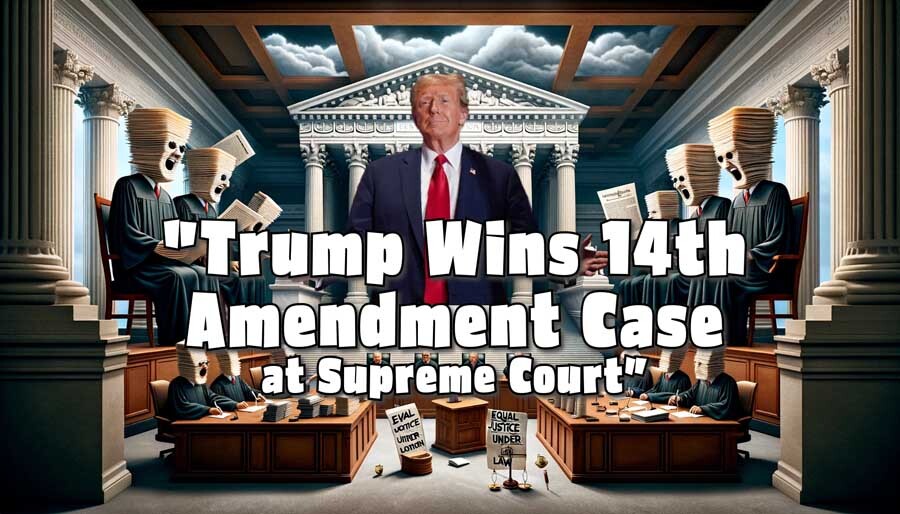 News Staff
News Staff![]() -
March 4, 2024 -
Arts & Culture -
Supreme Court
The Teflon Trump Edition
Chief Maestro John Roberts
-
4.9K views -
0 Comments -
0 Likes -
0 Reviews
-
March 4, 2024 -
Arts & Culture -
Supreme Court
The Teflon Trump Edition
Chief Maestro John Roberts
-
4.9K views -
0 Comments -
0 Likes -
0 Reviews

DLNews Politics:
In the latest episode of "The Courtroom Chronicles: The Teflon Trump Edition," the Supreme Court has once again found itself in the spotlight, delivering a ruling that seems to have taken a page straight out of a political thriller with a twist of legal acrobatics. The decision, a plot twist worthy of a primetime drama, confirmed that former President Donald Trump's name should grace the ballots, immune to the 14th Amendment's "insurrectionist ban" like a superhero donning a cloak of legal invincibility.
In what could only be described as a judicial tango, the Court, led by its Chief Maestro John Roberts and his band of conservative justices, danced around the insurrectionist accusations with questions so pointed they might as well have been pirouettes. The performance was so choreographed it left spectators wondering if they had stumbled into a ballet rather than a courtroom, with justices leaping over legal arguments in a single bound.
In a unanimous encore, the Court declared that no state could single-handedly uninvite Trump from the presidential party ballot, citing a lack of constitutional RSVP. This dramatic overture left the states of Colorado, Maine, and Illinois, who had attempted to enforce a "No Trumps" policy, with invitations in hand, confetti unused.
However, the Court's magnum opus was not without its dissonant notes. In a rare bipartisan quartet, four justices expressed reservations about the sweeping nature of the decision, hinting at concerns over the potential for future electoral symphonies to be composed without the full orchestra's agreement.
The decision's choreography avoided the insurrectionist pas de deux altogether, sidestepping whether Trump's January 6th performance constituted a leading role in an insurrection. This omission was a strategic adagio, focusing instead on the constitutional choreography that prevents states from deciding who gets to lead the federal dance.
Justice Amy Coney Barrett, in a solo performance, called for a lowering of the national temperature, perhaps fearing that the political theater was becoming too heated, even for those with the best seats in the house. Meanwhile, the liberal justices' critique, a sharp allegro in the concerto, lamented the majority's broad sweep, fearing it might curtain future attempts to enforce the insurrectionist ban.
The court recently issued a "per curiam" opinion, a rare form of judgment that means "by the court." This type of ruling is used to indicate a consensus without revealing a unanimous agreement and must be signed by a specific author. However, these opinions are often criticized for lacking transparency and obscuring vote counts, especially when resolving contentious issues. The famous Bush v. Gore decision, which ultimately settled the 2000 presidential election, is a perfect example of the impact of a per curiam opinion. Despite the appearance of unity, such decisions can mask significant dissent, as evidenced by sharply worded concurring opinions that highlight underlying disagreements within the court's reasoning.
As the curtain falls on this episode, the audience is left to ponder the implications of the Court's decision, which has effectively set the stage for Trump's potential return in a 2024 presidential encore. Critics and supporters await the next act, wondering whether this performance was a tragedy, a comedy, or perhaps a bit of both. In the grand theater of American politics, the Supreme Court has ensured that the show will continue, with Donald Trump again playing a starring role.

At Desert Local News, connections are everything. We're not just another social networking platform—we're a lively hub where people from all walks of life come together to share stories, spark ideas, and grow together. Here, creativity flourishes, communities grow stronger, and conversations spark global awareness.
Share this page with your family and friends.